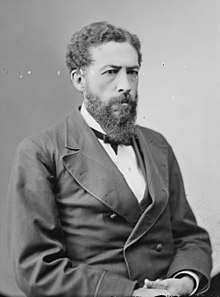John Mercer Langston is one of the five African Americans elected officeholders prior to 1867. He was elected to public office as the clerk of Brownhelm, Ohio.
He was an abolitionist, a lawyer, educator, activist, diplomat, and politician in the United States.
According to his biography, Langston was one of the most prominent African Americans in the United States before and during the Civil War. He was said to be as famous as Frederick Douglass.
His political career led him to become the first black man to represent Virginia in the U.S. House of Representatives.

Born in Louisa County, Virginia in 1829, Langston was the youngest of four children born to his father Ralph Quarles who was a slave-owner. But Langston took his surname from his mother, Lucy Langston, a free slave of Indian and black ancestry.
Unfortunately, he lost both his parents in 1834 when he was only five years old. He and his older siblings moved to Missouri where they were taken in by William Gooch, a friend of Quarles.
At 14 years, Langston began his studies at Oberlin College, the first college in the United States to admit black and white students. He completed his studies in 1849.
In 1854, Langston married Caroline Matilda Wall, an emancipated slave from North Carolina. The two of them had some things in common. They had been born into slavery and were freed by their slave-owning fathers. They both attended Oberlin, but Wall graduated in 1856.

When Langston was elected town clerk of Brownhelm Township in Ohio in 1855, he became the first black elected official in the state. Apart from his law practice and work as a town clerk, Langston and his brothers participated in the Underground Railroad.
After a year, he left Brownhelm for Oberlin and served on the town’s board of education. Reportedly, he also served on the Oberlin city council. Langston served as Inspector General of the Freedmen’s Bureau, touring the postwar South and encouraging freedmen to seek educational opportunities in 1867.
He would often speak out against segregated facilities, including churches.
Along the way, the abolitionist and lawyer was said to have caught the attention of Douglass, who urged him to deliver antislavery speeches. During the Civil War, it was Langston who recruited black volunteers for the Massachusetts 54th Infantry Regiment, officially the country’s first African-American military unit.
While at Washington, D.C., he helped establish the nation’s first black law school at Howard University in 1868. Langston became the law school’s first dean and served temporarily as acting president of the university in 1872.
In 1877, President Rutherford B. Hayes appointed Langston U.S. minister to Haiti. He didn’t return to the U.S. until 1885 and when he did, he became the president of Virginia Normal and Collegiate Institute (now Virginia State University).
Three years after, the activist and diplomat ran for a seat in Congress as an Independent candidate against a white Democratic opponent in 1888. Representing the “Black Belt of Virginia,” a region whose population was 65 percent black, the election led to some “stark racial divisions” and a standoff with abolitionist Douglass.
According to history.house.gov, several influential African Americans campaigned against Langston. Douglass, who was said to be chief among Langston’s detractors, wrote a letter denouncing his candidacy. Langston’s opponents spread copies of that letter throughout the district.
For 18 months, the results of the election were contested but Langston was finally declared the winner and served for six months.
He, however, lost his reelection bid in 1890. He retired in 1894 and wrote his autobiography “From the Virginia Plantation to the National Capital’.
Langston died in Washington, D.C. on November 15, 1897. The town of Langston, Oklahoma and the college created in the town, Langston University, were named after him.










